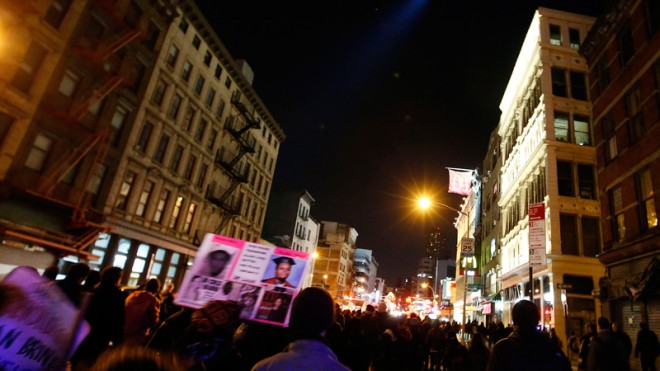Civil rights leaders decry chokehold case decision

A police helicopter shines a light on a group of protesters rallying against a grand jury’s decision not to indict the police officer involved in the death of Eric Garner as they march along Canal Street in the early morning hours of Thursday, Dec. 4, 2014, in New York. (AP Photo/Jason DeCrow)
NEW YORK — Civil rights leaders Thursday decried the grand jury decision not to charge a white New York City police officer in the chokehold death of a black man and announced plans for a march and a summit on racial justice in Washington later this month.
The case of Eric Garner — combined with the decision by a grand jury last week not to charge the white officer who shot and killed unarmed black 18-year-old Michael Brown in Ferguson, Missouri — stirred a national conversation about race, police training and the grand jury process.
National Urban League President Marc Morial said the lack of an indictment in the death of Eric Garner was “a travesty of justice.” He said he and other civil rights leaders are calling for 2015 to be “a year for justice and jobs.”
Thousands of people protested in New York, chanting and blocking traffic, after the grand jury decided Wednesday not to bring charges against Officer Daniel Pantaleo in Garner’s death. The decision came a week after a Missouri grand jury made a similar ruling in Brown’s case.
Police said 83 people were arrested in New York, mostly on disorderly conduct charges.
Garner, 43, died as officers were attempting to arrest him for selling untaxed cigarettes on the street.
Unlike Brown’s shooting, Garner’s July 17 arrest was captured on videotape. The Garner case could have even wider repercussions, particularly because it happened in the nation’s most prominent city and one with a liberal tradition.
About 20 civil rights leaders met behind closed doors Thursday at the New York City headquarters of Rev. Al Sharpton’s National Action Network. Sharpton, one of the country’s most outspoken civil rights activists, said a civil rights summit will be held following a Dec. 13 march in Washington. He said the topics will include education and boycotts.
On Thursday morning, yet another case was added to the mix: A white former police chief in South Carolina was charged with murder in the shooting death of an unarmed black man after an argument at a town hall meeting.
And in Los Angeles, police Chief Charlie Beck said Thursday that three officer violated deadly-force rules when they shot an unarmed man last year on live television after a high-speed chase. The chief will now have to decide what punishment, if any, to give the officers who have been relieved of duty since the December 2013 shooting.
The video of Garner’s arrest, shot by an onlooker and widely viewed on the Internet showed, Garner telling a group of police officers to leave him alone as they tried to arrest him. Pantaleo responded by wrapping his arm around Garner’s neck in what appeared to be a chokehold, which is banned under the New York Police Department’s policy.
The heavyset Garner, who had asthma, was heard repeatedly gasping, “I can’t breathe!”
A second video surfaced that showed police and paramedics appearing to make no effort to revive Garner while he lay motionless on the ground. He later died at a hospital.
Pataleo’s lawyer and police union officials argued that the grand jury got it right, saying that the officer used an authorized takedown move — not a banned chokehold — against a man who was resisting arrest. And they said Garner’s poor health was the main cause of his death. The medical examiner ruled that the chokehold contributed to Garner’s death.
In the Staten Island district neighborhood where Garner died, people reacted with angry disbelief at the grand jury decision and chanted, “I can’t breathe!” and “Hands up — don’t choke!”
Some legal experts said the Garner case, like the one in Ferguson, again raised concerns about the influence local prosecutors have over the process of charging the police officers they work with on a daily basis.
Ekow N. Yankah, a professor at New York’s Cardozo School of Law, said: “It is hard to understand how a jury doesn’t see any probable cause that a crime has been committed or is being committed when looking at that video, especially.”
Garner’s widow, Esaw, said she had no faith in the local prosecutors.
“As far as the police and the (District Attorney), there was no sincerity from Day One,” she said on the “Today” show.
Attorney General Eric Holder said federal prosecutors will conduct their own investigation of Garner’s death. TheNew York Police Department is doing an internal investigation that could lead to administrative charges against Pantaleo, who remains on desk duty.














